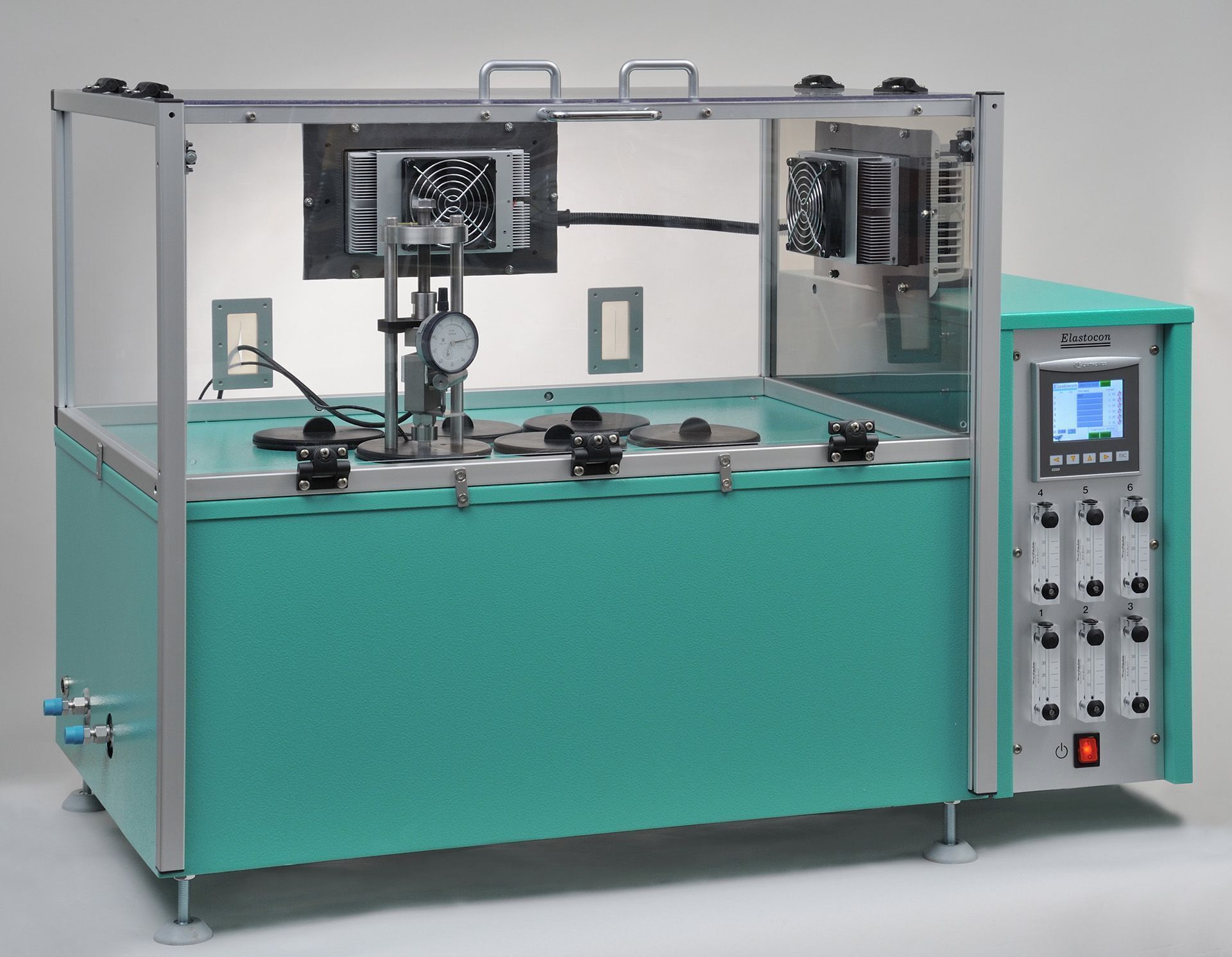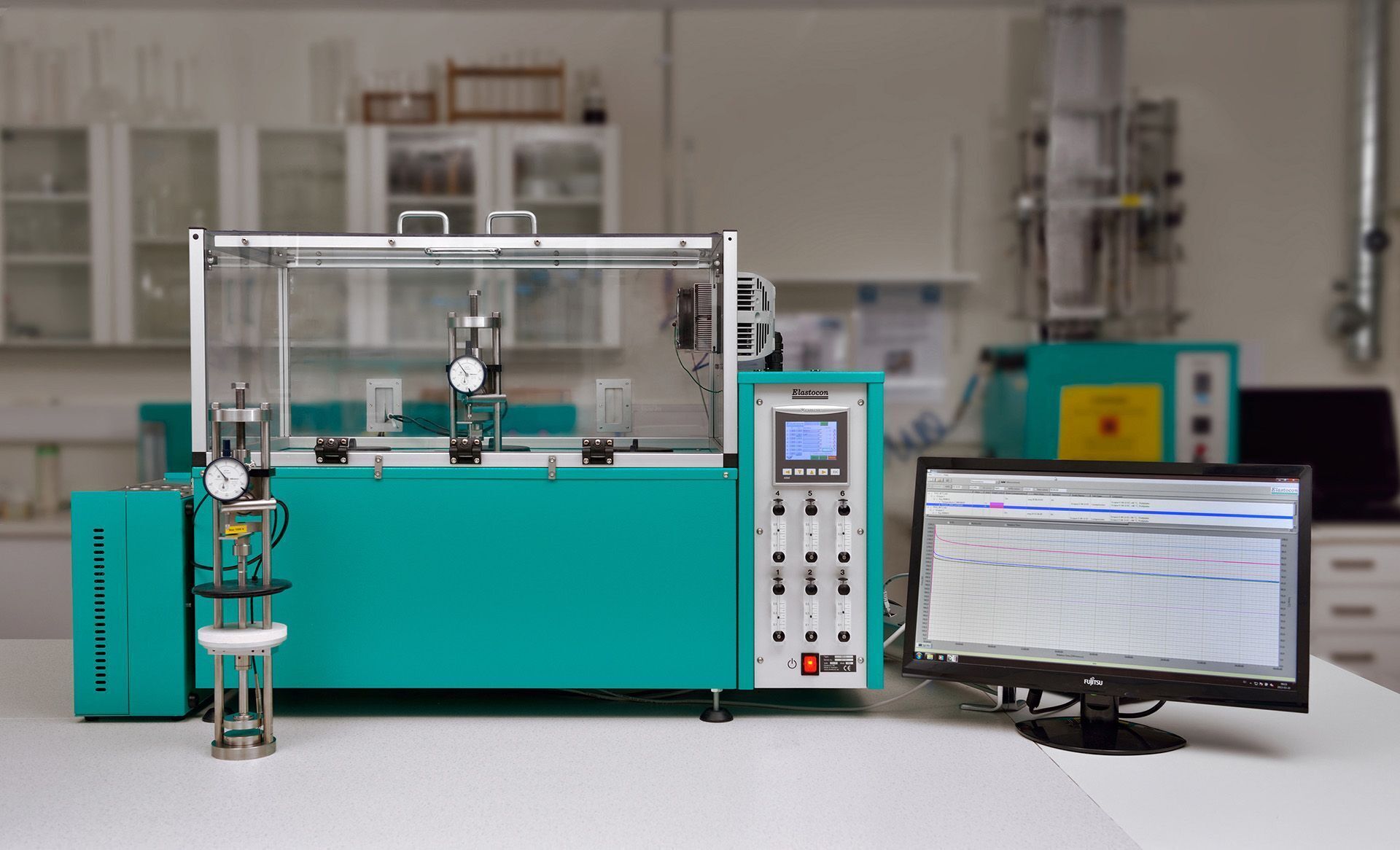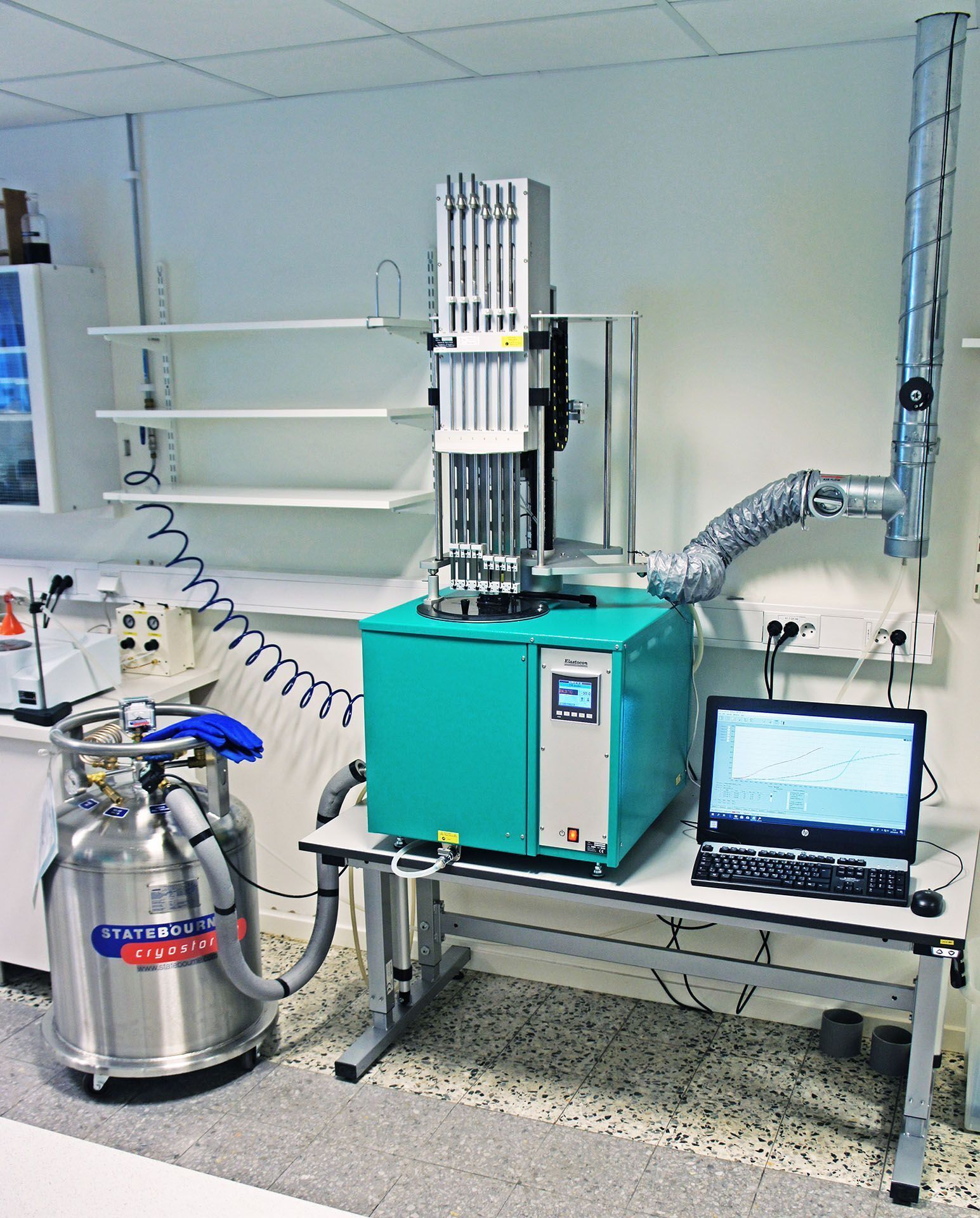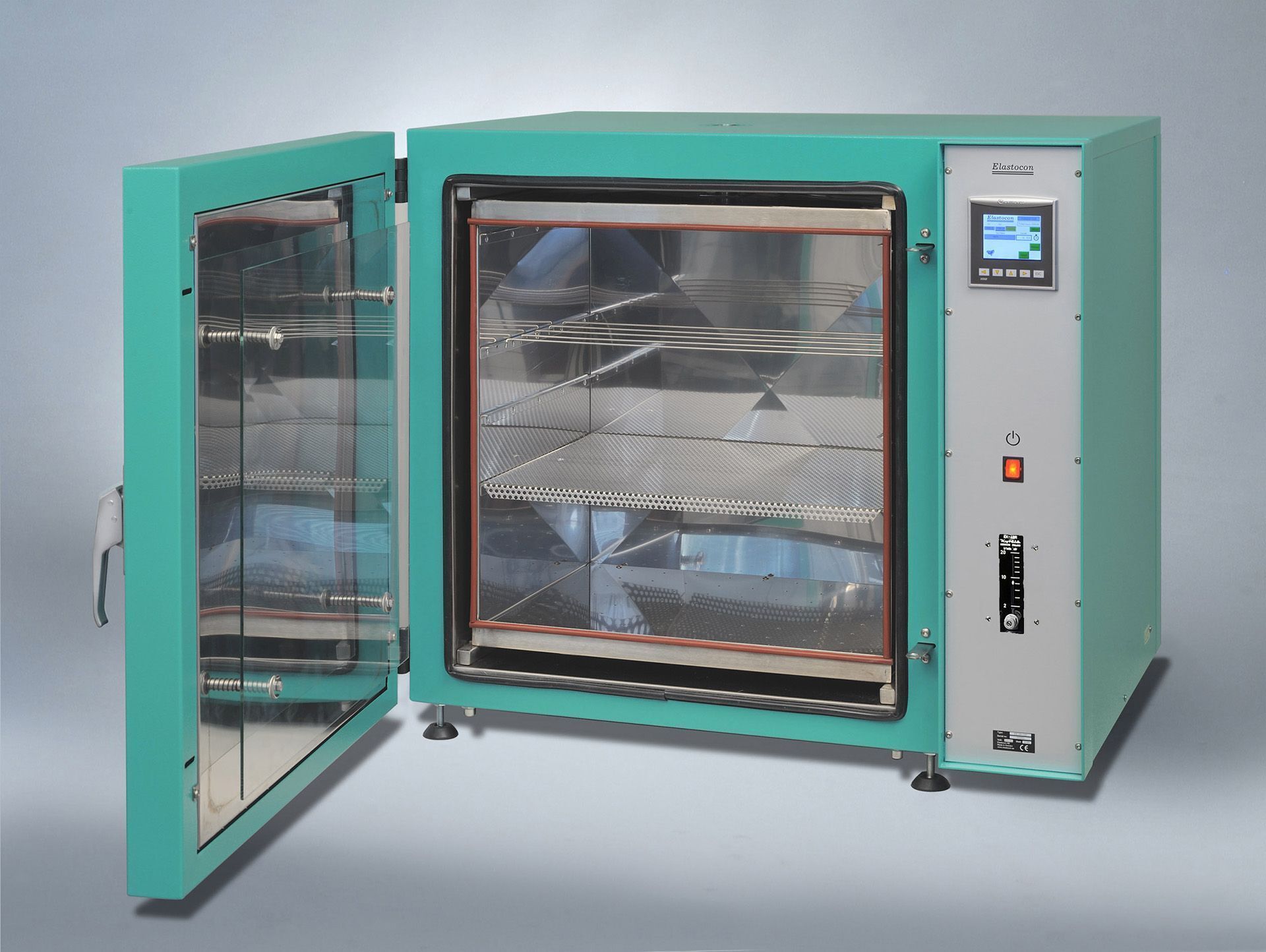Hardness Tester
Manufacturer of innovation and accredited testers for quality securing in the following industries... Automotive industrie | chemical industry | cosmetics industrie | food industry | aerospace industry | laboratories | institutes | medical technology | optics | pharmaceutics
RPA ultra The future of material testing starts now.
State of the Art
In the version of the RPA used by Monsanto to date, only oscillatory tests with variable frequency and strain can be performed – and thus usually used to determine the complex shear modulus and dynamic viscosity of a material. The classical approach of calculating both the storage modulus and the loss modulus with a simple trigonometric equation only applies to linear viscoelastic behavior.
The Problem
Filled rubber compounds, however, show a strongly non-linear rheological behavior (Payne effect) and the measurement signal of unfilled raw rubber becomes nonlinear at higher deformations (LAOS). The issue of compound processability also cannot be quantified to date. As a solution-oriented company, Bareiss has addressed this problem as part of a cooperative project funded by the ZiM and has developed an RPA with extended testing capabilities. This new type of advanced RPA testing allows access to valuable information contained in higher harmonics, steady-state shear viscosity or non-elliptic Lissajous figures.
“The RPA ultra shifts the quality of testing to an unrivaled level.”

The Solution
The rotational lower die allows the transient viscosity of materials to be determined for the first time in areas that are highly relevant to production. Compared to dynamic viscosity, transient viscosity reflects the realistic processing of rubber compounds. The RPA ultra from Bareiss can certainly perform all test methods of a generic RPA, including isothermal and anisothermal tests, stress relaxation, frequency sweep and amplitude sweep.
Not only is it capable of performing oscillatory testing over a wider range of frequencies (10-3 Hz to 100 Hz) and strain range (unlimited strain LAOS), but also offers the possibility to perform a continuous shear rate in full rotation from 10-3 s-1 to 500 s-1, while standard RPA‘s can only measure up to a maximum of 30 s-1.
“This groundbreaking technology is different from any RPA on the market.”
With this type of test, the instrument has successfully measured constant shear viscosity with high repeatability without having to make the corrections required by capillary rheometers, for example.
The application
This instrument thus expands the range of applications to better describe, among other things, current topics in rubber technology such as wall slip behavior, polymer branching and sustainable fillers (rCB). The number of data points recorded per cycle has increased significantly, which in turn improves the signal-to-noise ratio when performing Fourier Transform Rheology.
The ranges in which the device operates at shear rates of 500 s-1 are typical of the extrusion range. Initial studies have already shown that such a measurement method can be used to make an estimate of the processability of a compound. This means that in the event of substitution or fluctuations in raw material quality, the user can recognize at a very early stage whether this compound can be processed well or whether further processing aids need to be added – this also offers crucial time saving and financial advantages in the new development of rubber compounds.
HP –manual Hardness Tester
- Hardness testers manual, mechanical
- Round, clearly arranged and antiglare scales.
- The scales graduation is 0-100 Shore, divided in 100 units.
Types
- Shore A, A0, B, 0, C, D, D0, 00, 000
- Bareiss Variant C (Asker C),
- Densimeter
Standards
- DIN 53505, DIN EN ISO 868,
- NF T 51-174,
- ASTM D 2240
- ISO 7619,
- BS 903 Part. A 26
HPE-III – Basic (digital Hardness Tester manual)
Digital handheld hardness tester for the measuring of Shore hardness, with illuminated display and integrated compression sleeve for vertical support and standard contact pressure.
The measured value memory allows the storage of 300 measured values.
Data can be sent to a PC via data output RS-232 cable with USB connector for data transfer and charging.
Measuring Methodes:
- Shore A
- Shore A0
- Shore D
- Shore 0
- Shore 00
- Shore 000
- Shore 000S
- Shore E
- Shore B
- Shore C
- Shore D0
- Asker C
- Asker CS
- Asker F
Standards:
- ASTM D2240
- DIN ISO 48-4
- DIN EN ISO 868
- JIS K 6253
HPE-III (digitale Hardness Tester manual)
Digital premium handheld hardness tester for the Shore hardness measurement with illuminated display, sensors for the recording of environmental conditions and integrated compression sleeve for vertical support and standard contact pressure.
The measured value memory allows the storage of 300 measured values.
Data can be sent to a PC via data output RS-232 cable with USB connector for data transfer and charging.
Measuring Methodes:
- Shore A
- Shore D
Standards:
- ASTM D2240
- DIN ISO 48-4
- DIN EN ISO 868
HPE II Kfz Interieur
Digital handheld hardness tester for the measuring of the surface tension on large parts of the vehicle interior, made of foam or with sandwich constructed composite, with a flexible outer skin and a hard base shell.
The measured value memory allows the storage of 300 measured values.
Data can be sent to a PC via data output RS-232 cable for data transfer.
HPE III L
Digital hardness tester with special centering unit and holder for hardness measurements on foamed materials of motor vehicle steering wheels.
Standards:
- Various company standards
Specimen geometry:
- Free forms
Barcol Tester
Digital handheld hardness tester with stabilizing ring for the recording of the Barcol hardness on plate-shaped test specimens from glass fiber reinforced plastics, thermosetting plastics, hard thermoplastics and light metals.
STANDARDS:
- DIN EN 59, ASTM D 2583
HPEII – Pusey & Jones
Digital hardness tester with integrated test stand and adjustable base for the hardness measurement of rubber or rubber-like materials, of rollers or similarly curved geometries.
Standards:
- ISO 7267-3
Description:
With this measuring instrument a simple, fast and well reproducible measurement of the penetration depth under load is possible for rubber and rubber like materials, like e.g. rubber rollers and standard blocks. Mobile feet serve for the reliable placement on the rubber roller.
The electronic dial gauge reads the penetration depth in 0.00 units directly and is equipped with a zeroing function.
The big advantage of this is that the display of the dial gauge can be set for zero by pressing a key, as soon as the indenter with measuring rod is raised approximately for about 3 mm after lowering the body of the hardness tester. By an integrated vertical spindle, which is at the back of the hardness tester, the dial gauge can be lifted or lowered sensitively.
HPE III – Fff
Digital handheld hardness tester with exchangeable indenters for non-destructive testing of the firmness of fruit and vegetables. For trading companies the firmness of the fruit pulp is an importan tquality criterion. The harvest date of the fruits is specified by the firmness measurement, in consideration of the transportation duration to the place of destination and / or duration of storage.
Range of Application
Firmnesstests on:
Peaches, apricots, plums, cherries, tomatoes, strawberries, apples, avocados, kohlrabi, carrots, cucumbers, radish etc.
Take care of the different testanvils (see accessories).
Digitest II - Hardness Tester
Modular digital measuring device for fully-automated hardness tests, according to Shore, VLRH and IRHD on polymers with variable test geometries.
Standards:
DIN EN ISO 868, DIN 53505, FN-EN ISO 868, ASTM D 2240, ISO 7619, BS 903 Part. A 26 DIN ISO 48, NF T 46-003, ASTM D 1415, DIN ISO 27588
Advantages of digi test:
- Electronic unit provides clear display of measured value, navigation menu and Data Output.
- Easy to use with limited operator influence to guarantee accurate and repeatable hardness test results.
- Reading in the display gives assistance for the correct selection of the measuring device during your measurement when the measured value is above or below the limit value.
- USB-interface for data transfer.
- Modular, digital hardness testing system.
- Automatic identification of the measuring range and of the measuring time
Digi-Chamber
High-quality temperature control or climatic chamber in conjunction with the proven hardness tester digi test II, rotation table and software with database function, for serial testing of the hardness of polymers according to Shore A, D or IRHD N, depending on the temperature.
Measuring Methodes:
- Shore A
- Shore D
- IRHD N
Sample Geometry:
- O-rings
- Sheet material
- Workpieces and thin samples
Test System HDA 120
Combined hardness-density machine with PLC and touchscreen for determining hardness and density on flat test specimens made of rubber-elastic, non-foamed plastics, elastomers and other rubber products.
Measuring Methodes:
- Shore A
- Shore A0
- Shore 0
- Shore B
- Asker C
- IRHD L
- IRHD N
- IRHD M
- VLRH
- IRDH H
Sample Geometry:
- Ø 35 – 42 mm
- Plate-shaped samples with at least 6 mm thickness
Standards:
- ASTM D792
- ASTM D2240
- DIN ISO 48-2
- DIN ISO 48-4
- DIN EN ISO 868
- DIN EN ISO 1183-1
- ISO 2781
Technical Data:
- Power supply: 100 – 240 V; 50 – 60Hz; 10 A
- Operating period: 24/7
- Protection type; IP 30
- Measurements: 900 x 700 x 1000 mm
- Weight: 900 x 700 x 1000
- Data logger: 50 internal
- Compressed air: 4 – 6 bar
- Sample throughput: HDA 120: 50 / h
- Sample feeding: HDA 120: 1 – 20 Proben
Abrasion testing machine
Automated testing device for determining the abrasion resistance of elastomers in the material loss process.
Measuring Methodes:
- Abrasion resistance, Method A with stationary, non-rotating sample
- Abrasion resistance, method B with rotating sample
- Abrasion path changeable to 20 or 40 meters
Sample Geometry:
- Ø16,2mm
Environmental conditions:
With this abrasion testing machine, the material loss of an elastomer specimen can only be determined at room temperature. To test the abrasion resistance of a material under the influence of temperature, we recommend using our Q abrasion testing machine. This is equipped with a quartz heater, allowing for the abrasion drum to be heated up to 100° C.
Standards:
- ASTM D5963
- DIN ISO 4649
Rebound Elasticity Tester
Fully-automatic digital measuring device with guided pendulum hammer, external electronic unit and optional temperature control module for the determination of rebound resilience on elastomers.
Standards:
- DIN 53512, DIN 53573, ISO 4662,
- ASTM D 1054-91
Bullet Rebound Tester
Digital measuring device with downpipe, sensors and connected electronic unit for determining the ball rebound resilience through the free fall of a ball on soft, elastic, polymeric foam materials.
ASTM D 3574.
Description:
A quick, easy and reliable measurement is made by the Ball Rebound Tester because of its innovative testing technology.
- short training period
- short measuring cycle
- no adjustment is needed
A two lined display reads the measured value and median value in %. The testing device is equipped with a serial interface.
BaRotation
Modular digital measuring device with laser measurement, rotation table and electronic unit for the automated hardness measurement according to IRHD or Micro Shore A on O-rings and plates.
Measuring Methodes:
- IRHD M
- M Shore A
Specimen geometry:
- Free Forms
Standards:
- DIN ISO 48-2
- TD 00002001
3106 hardness tester ball indentation hardness/Rockwell hardness
Modular measuring device with digital unit for the assessment of ball pressure or Rockwell hardness, on carbon and graphite materials, metals, polymers, building materials, floor coverings or asphalt. DIN EN ISO 6508-2 / ASTM E 18 / ASTM D 785
Measuring Methodes:
- There are various devices for different purpose savailable:
- Hardness test on elastic floor covering acc. to DIN EN 433, table 1
- Hardness test for the ball indentation hardness on plastic acc. to DIN EN ISO 2039-1
- Hardness test Rockwell on metal acc. to DIN EN ISO 6508-2 / ASTM E 18/ ASTM D 785
- Hardnes stest Rockwell on carbon material acc. to DIN 51917/ DIN EN IEC 413
- Hardness test on building plaste racc. to DIN EN 13279
- Hardness test on asphal tacc. to DIN 1996-13
- Device for the determination of the compression and recovery of seals acc. to ASTM F 36-99
Punching Press SP 1000
Manual punching device for the making of standard test specimens, used for material testing on rubber, elastomers and flexible polymer foam materials.
Technical Specification:
- Measurements: 270 x 270 x 600 mm
- Weight: 20 kg
- Punch
- Pressure: 5 kN
- Depth: max. 24 mm
- Swing
- max. 60 mm
- Supporting table
- max. 175 x 270 mm
Sample Geometry:
Plate-shaped samples
Punching Press SP 4000
Manual punching device with interchangeable holder for four turrets, for the making of standard test specimens, used for material testing on rubber, elastomers and flexible polymer foam materials.
Standards:
- Schulterstäbe nach DIN 53504
- Streifenproben nach ISO 34-1
- Winkelprobe nach Graves nach ISO 34-1
- Dumbbell specimens according to DIN 53504
- Strip tests according to ISO 34-1
- Angle test according to Graves, according to ISO 34-1
For the punching press SP 4000, the punching devices for specimens from flat materials are manufactured in accordance with all standards, at the request of the customer. It is also possible to manufacture individual special shapes, in accordance with the associated drawings. Just ask us
Sample Geometry:
- Plate-shaped samples
Technical Data:
- Measurements: 300 x 300 x 450 mm
- Weight: 50 kg
- Punch
- Pressure: 5 kN
- Depth: max. 24 mm
- Swing
- max. 60 mm
- Supporting table
- max. 120 x 330 mm
Accessories
TEST BLOCKS
Plane-parallel test specimens made from reference elastomers with various hardness levels, for the assessment of the indenter and the measuring path of your hardness measuring device.
Measuring Methodes:
- Shore A
- Shore A0
- Shore D
- Shore 0
- Shore 00
- Shore 000
- Shore 000S
- Shore E
- Shore B
- Shore C
- Shore D0
- Asker C
- Asker CS
- Asker F
- Shore AM
Sample Geometry:
- Min. 6 mm
Technical Data:
Measurements: Metal frame Ø 50 mm or Ø 30 mm; depending on the measuring method
Weight:
- Set of 1: 0,1 kg
- Set of 3: 0,4 kg
- Set of 6: 0,6 kg
Standards:
- ASTM D531
- ASTM D2240
- ASTM D2583
- DIN ISO 48-2
- DIN ISO 48-4
- DIN ISO 48-8
- DIN EN ISO 868
- DIN EN 59
- JIS K 6253
- JIS K 7312
Shore control device
Mechanical measuring device for checking the spring characteristics of analog or digital Bareiss handheld hardness testers.
Measuring Methodes:
- Shore A
- Shore A0
- Shore D
- Shore 0
- Shore E
- Shore B
- Shore C
- Shore D0
- Shore L
- Shore L/c
Standards:
- ASTM D2240
- DIN ISO 48-4
- DIN EN ISO 868
- JIS K 6253
























